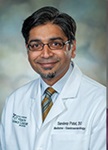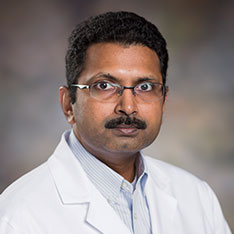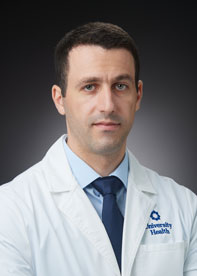What Is Endoscopy?
Endoscopy allows your doctor to see inside your digestive tract to check for potentially serious conditions. In a general endoscopy procedure, your doctor inserts a flexible tube called an endoscope into your body through your mouth or rectum. The endoscope is fitted with a light and a miniature camera. Pictures from inside your body can be projected onto a screen in real time for your doctor to view.
Endoscopy is minimally invasive and a powerful tool for diagnosing gastrointestinal disorders. University Health also offers more specialized advanced interventional endoscopy. University has the only endoscopy specialists in South Texas who all have fellowship training, so you receive the highest possible level of care.
Endoscopy takes place at our state-of-the-art Endoscopy Center.
When Is Endoscopy Used?
When you have symptoms caused by a condition within your digestive tract, endoscopy is often the most effective tool to diagnose it. Those conditions may be relatively minor, but may also indicate a more serious condition including:
- Biliary system and gallbladder disorders
- Cancer
- Digestive and metabolic disorders
- Esophagus disorders
- Intestine, colon and rectal gastroenterology disorders
- Liver disorders
- Pancreas disease
- Stomach disorders
What to Expect in Endoscopy
You usually feel more comfortable and relaxed when you know what to expect before you have a test or procedure. Here we explain what you can expect when you are scheduled for endoscopy.
Talk to your doctor about any special preparation, whether you need to stop taking any medications before your endoscopy, and when to stop food and drink beforehand. Be sure you have another adult drive you home since you’ll have sedation medication.
As you arrive, you’ll change into a hospital gown and lie down on a stretcher/bed in a procedure room. When you’re ready, our team will follow these steps:
- Your doctor or a nurse will explain your procedure, answer questions and provide a consent form to sign.
- You will receive medication through an IV to relieve any pain and relax you before the procedure.
- You will remain conscious, but you may not even remember the procedure.
- We will position you for the procedure.
- You may feel mild bloating or cramping. Our experienced endoscopy team of doctors, nurses and endoscopy technicians will make sure you are comfortable.
Endoscopy takes about 15 to 30 minutes. You will stay with us for another 30 to 60 minutes afterward in a recovery area, and we will check your vital signs before you go home.



